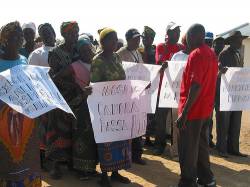 With an estimated 1.2 million people over the age of 60, Mozambique has the third largest older population in Southern Africa. However, unlike many of the countries in the region, it does not have a social pension with extensive coverage or a dignified value. Although the Government has recently made significant advances in developing a system for social protection in the country, many Mozambicans still face an old age without the guarantee of a minimum income, leaving them vulnerable to poverty and marginalisation.
With an estimated 1.2 million people over the age of 60, Mozambique has the third largest older population in Southern Africa. However, unlike many of the countries in the region, it does not have a social pension with extensive coverage or a dignified value. Although the Government has recently made significant advances in developing a system for social protection in the country, many Mozambicans still face an old age without the guarantee of a minimum income, leaving them vulnerable to poverty and marginalisation.
Poverty amongst the population as a whole remains high; Mozambique is ranked fifth lowest in the world by the Human Development Index and the numbers of people living in poverty actually increased between the two most recent national poverty assessments. At the same time, Mozambique has been lauded for its sustained economic growth, led largely by small sectors of the private sector. The recent discovery of extensive natural resources in the centre and north of the country are being hailed as the key to a sustainable future for the country.
Achieving inclusive growth
But, transforming economic growth into inclusive growth will likely remain a challenge – especially as the social protection system in Mozambique is still marginal to the development debate. This is in turn reflected by Central Government’s inadequate investment in the 54 per cent of the population who continue to live below the poverty line. Current policy debates are analysing the possibility of scaling up existing programmes, such as the productive social action programme, with the intention of developing a coherent and effective social protection system. Identifying appropriate interventions will require a thorough understanding of the poverty dynamics of the population as a whole. With many competing priorities the lack of research around poverty amongst the older population risks their needs being marginalised by the policy agenda.
Our research

The Institute of Social and Economic Studies (IESE), in collaboration with HelpAge International, has been requested by the Ministry of Women and Social Action to conduct research into the Poverty Dynamics of Older Mozambicans.
Funded by the German Federal Ministry for Economic Co-operation and Development (BMZ), the research will use existing socio-economic data sets to explore the relative poverty levels of the older population. Additionally, it will analyse the potential impact and cost of implementing various universal pension scenarios in Mozambique on different population groups. IESE plans to organize a seminar in April to share the findings to stimulate the national debate on social protection and the centrality of pensions for older people in reducing poverty in Mozambique.
